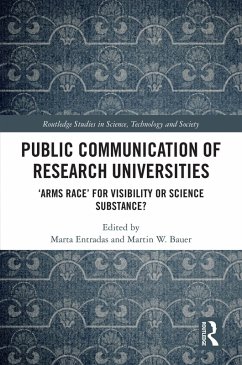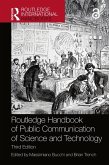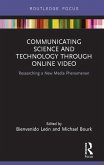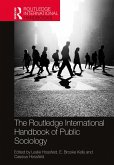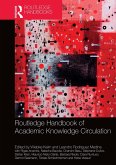Public Communication of Research Universities (eBook, PDF)
'Arms Race' for Visibility or Science Substance?
Redaktion: Entradas, Marta; Bauer, Martin W.
42,95 €
42,95 €
inkl. MwSt.
Sofort per Download lieferbar

21 °P sammeln
42,95 €
Als Download kaufen

42,95 €
inkl. MwSt.
Sofort per Download lieferbar

21 °P sammeln
Jetzt verschenken
Alle Infos zum eBook verschenken
42,95 €
inkl. MwSt.
Sofort per Download lieferbar
Alle Infos zum eBook verschenken

21 °P sammeln
Public Communication of Research Universities (eBook, PDF)
'Arms Race' for Visibility or Science Substance?
Redaktion: Entradas, Marta; Bauer, Martin W.
- Format: PDF
- Merkliste
- Auf die Merkliste
- Bewerten Bewerten
- Teilen
- Produkt teilen
- Produkterinnerung
- Produkterinnerung

Bitte loggen Sie sich zunächst in Ihr Kundenkonto ein oder registrieren Sie sich bei
bücher.de, um das eBook-Abo tolino select nutzen zu können.
Hier können Sie sich einloggen
Hier können Sie sich einloggen
Sie sind bereits eingeloggt. Klicken Sie auf 2. tolino select Abo, um fortzufahren.

Bitte loggen Sie sich zunächst in Ihr Kundenkonto ein oder registrieren Sie sich bei bücher.de, um das eBook-Abo tolino select nutzen zu können.
This book analyses communication of university research institutes, with a focus on science communication. Advancing the 'decentralisation hypothesis', it asserts that communication structures are increasingly built also at 'subordinate unit' levels of research universities.
- Geräte: PC
- ohne Kopierschutz
- eBook Hilfe
- Größe: 8.92MB
Andere Kunden interessierten sich auch für
![Public Communication of Research Universities (eBook, ePUB) Public Communication of Research Universities (eBook, ePUB)]() Public Communication of Research Universities (eBook, ePUB)42,95 €
Public Communication of Research Universities (eBook, ePUB)42,95 €![Routledge Handbook of Public Communication of Science and Technology (eBook, PDF) Routledge Handbook of Public Communication of Science and Technology (eBook, PDF)]() Routledge Handbook of Public Communication of Science and Technology (eBook, PDF)46,95 €
Routledge Handbook of Public Communication of Science and Technology (eBook, PDF)46,95 €![Communicating Science and Technology Through Online Video (eBook, PDF) Communicating Science and Technology Through Online Video (eBook, PDF)]() Communicating Science and Technology Through Online Video (eBook, PDF)23,95 €
Communicating Science and Technology Through Online Video (eBook, PDF)23,95 €![The Routledge International Handbook of Public Sociology (eBook, PDF) The Routledge International Handbook of Public Sociology (eBook, PDF)]() The Routledge International Handbook of Public Sociology (eBook, PDF)46,95 €
The Routledge International Handbook of Public Sociology (eBook, PDF)46,95 €![Routledge Handbook of Digital Media and Communication (eBook, PDF) Routledge Handbook of Digital Media and Communication (eBook, PDF)]() Routledge Handbook of Digital Media and Communication (eBook, PDF)46,95 €
Routledge Handbook of Digital Media and Communication (eBook, PDF)46,95 €![The Routledge International Handbook of Goffman Studies (eBook, PDF) The Routledge International Handbook of Goffman Studies (eBook, PDF)]() The Routledge International Handbook of Goffman Studies (eBook, PDF)46,95 €
The Routledge International Handbook of Goffman Studies (eBook, PDF)46,95 €![Routledge Handbook of Academic Knowledge Circulation (eBook, PDF) Routledge Handbook of Academic Knowledge Circulation (eBook, PDF)]() Routledge Handbook of Academic Knowledge Circulation (eBook, PDF)46,95 €
Routledge Handbook of Academic Knowledge Circulation (eBook, PDF)46,95 €-
-
-
This book analyses communication of university research institutes, with a focus on science communication. Advancing the 'decentralisation hypothesis', it asserts that communication structures are increasingly built also at 'subordinate unit' levels of research universities.
Dieser Download kann aus rechtlichen Gründen nur mit Rechnungsadresse in A, B, BG, CY, CZ, D, DK, EW, E, FIN, F, GR, HR, H, IRL, I, LT, L, LR, M, NL, PL, P, R, S, SLO, SK ausgeliefert werden.
Produktdetails
- Produktdetails
- Verlag: Taylor & Francis
- Seitenzahl: 320
- Erscheinungstermin: 5. Mai 2022
- Englisch
- ISBN-13: 9781000580549
- Artikelnr.: 63894306
- Verlag: Taylor & Francis
- Seitenzahl: 320
- Erscheinungstermin: 5. Mai 2022
- Englisch
- ISBN-13: 9781000580549
- Artikelnr.: 63894306
- Herstellerkennzeichnung Die Herstellerinformationen sind derzeit nicht verfügbar.
Marta Entradas is Assistant Professor at the Department of Sociology at Iscte-Lisbon University Institute and Visiting Fellow at the London School of Economics and Political Science (LSE). She is a former Marie Curie Fellow at LSE (2016-18), and Fulbright Scholar at Cornell University (2015-16). In a current FCT-funded project (grant PTDC/COM-OUT/30022/2017), she is leading a cross-national study examining public communication at central communication offices at research universities. She received her Ph.D. in Science and Technology Studies (STS) from UCL in 2011. She is the 'European Young Researcher (EYRA) Award' 2016 winner (Euroscience). Martin W. Bauer read Psychology and Economic History (Bern, Zurich and London) and joined London School of Economics and Political Science LSE in the mid-1990s, after a post-doctoral fellowship at the Science Museum London. Professor of Social Psychology and a former Head of the LSE Methodology Department (2008-2010), he currently directs the Msc Social & Public Communication. He is a former Editor-in-Chief of the international journal Public Understanding of Science (2009-2016) and a regular academic visitor in Brazil (Porto Alegre, Campinas and Rio) and recently also to China, where he co-directs the Centre for Study of Science Cultures, an LSE-NAIS-Tsinghua University venture in Beijing.
PART I: INTRODUCTION AND OVERVIEW
1. Public Communication Activities of Research Institutes: Setting the Stage with the Decentralisation Hypothesis
2. Why and How to Sample Research Institutes: Methodological Challenges
PART II: CROSS-NATIONAL COMPARISONS
3. Professionalizing the Communication of Research Institutes
4. Public Duty or Self-Interest? Public Communication of University-Based Research Institutes after an Era of Governance Reforms in Europe
5. Perceived Successfulness of Public Engagement at Research Institutes
6. An Emerging "Arms Race": Resourcing the Public Communication Effort
7. Public Engagement Profiles and Types of Research Institutes
PART III: NATIONAL SITUATION AND PROFILES
8. The Communication of Research in Italy: The Efforts of Academia and Research Institutes
9. Public Engagement at Research Institutes in the Netherlands: Fertile Territory or Terra Nullius?
10. US American Scholars are Finding Paths to Engagement through their Research Institutes and Centers
11. Public Communication in Japanese Research Institutes: Still Dark or Sunrise?
12. Communicative Dispositions of British Research Institutes
13. Public Engagement Activities of German Research Institutes: A Tale of Two Worlds
14. 'Research Excellence' and Public Communication in Portugal
PART IV: METHODOLOGICAL CONSIDERATIONS
15. Studying Public Communication of Research Institutes: Sample Design and Data Collection
16. Framework and Indicators of Public Communication of Research Institutes
1. Public Communication Activities of Research Institutes: Setting the Stage with the Decentralisation Hypothesis
2. Why and How to Sample Research Institutes: Methodological Challenges
PART II: CROSS-NATIONAL COMPARISONS
3. Professionalizing the Communication of Research Institutes
4. Public Duty or Self-Interest? Public Communication of University-Based Research Institutes after an Era of Governance Reforms in Europe
5. Perceived Successfulness of Public Engagement at Research Institutes
6. An Emerging "Arms Race": Resourcing the Public Communication Effort
7. Public Engagement Profiles and Types of Research Institutes
PART III: NATIONAL SITUATION AND PROFILES
8. The Communication of Research in Italy: The Efforts of Academia and Research Institutes
9. Public Engagement at Research Institutes in the Netherlands: Fertile Territory or Terra Nullius?
10. US American Scholars are Finding Paths to Engagement through their Research Institutes and Centers
11. Public Communication in Japanese Research Institutes: Still Dark or Sunrise?
12. Communicative Dispositions of British Research Institutes
13. Public Engagement Activities of German Research Institutes: A Tale of Two Worlds
14. 'Research Excellence' and Public Communication in Portugal
PART IV: METHODOLOGICAL CONSIDERATIONS
15. Studying Public Communication of Research Institutes: Sample Design and Data Collection
16. Framework and Indicators of Public Communication of Research Institutes
PART I: INTRODUCTION AND OVERVIEW
1. Public Communication Activities of Research Institutes: Setting the Stage with the Decentralisation Hypothesis
2. Why and How to Sample Research Institutes: Methodological Challenges
PART II: CROSS-NATIONAL COMPARISONS
3. Professionalizing the Communication of Research Institutes
4. Public Duty or Self-Interest? Public Communication of University-Based Research Institutes after an Era of Governance Reforms in Europe
5. Perceived Successfulness of Public Engagement at Research Institutes
6. An Emerging "Arms Race": Resourcing the Public Communication Effort
7. Public Engagement Profiles and Types of Research Institutes
PART III: NATIONAL SITUATION AND PROFILES
8. The Communication of Research in Italy: The Efforts of Academia and Research Institutes
9. Public Engagement at Research Institutes in the Netherlands: Fertile Territory or Terra Nullius?
10. US American Scholars are Finding Paths to Engagement through their Research Institutes and Centers
11. Public Communication in Japanese Research Institutes: Still Dark or Sunrise?
12. Communicative Dispositions of British Research Institutes
13. Public Engagement Activities of German Research Institutes: A Tale of Two Worlds
14. 'Research Excellence' and Public Communication in Portugal
PART IV: METHODOLOGICAL CONSIDERATIONS
15. Studying Public Communication of Research Institutes: Sample Design and Data Collection
16. Framework and Indicators of Public Communication of Research Institutes
1. Public Communication Activities of Research Institutes: Setting the Stage with the Decentralisation Hypothesis
2. Why and How to Sample Research Institutes: Methodological Challenges
PART II: CROSS-NATIONAL COMPARISONS
3. Professionalizing the Communication of Research Institutes
4. Public Duty or Self-Interest? Public Communication of University-Based Research Institutes after an Era of Governance Reforms in Europe
5. Perceived Successfulness of Public Engagement at Research Institutes
6. An Emerging "Arms Race": Resourcing the Public Communication Effort
7. Public Engagement Profiles and Types of Research Institutes
PART III: NATIONAL SITUATION AND PROFILES
8. The Communication of Research in Italy: The Efforts of Academia and Research Institutes
9. Public Engagement at Research Institutes in the Netherlands: Fertile Territory or Terra Nullius?
10. US American Scholars are Finding Paths to Engagement through their Research Institutes and Centers
11. Public Communication in Japanese Research Institutes: Still Dark or Sunrise?
12. Communicative Dispositions of British Research Institutes
13. Public Engagement Activities of German Research Institutes: A Tale of Two Worlds
14. 'Research Excellence' and Public Communication in Portugal
PART IV: METHODOLOGICAL CONSIDERATIONS
15. Studying Public Communication of Research Institutes: Sample Design and Data Collection
16. Framework and Indicators of Public Communication of Research Institutes
